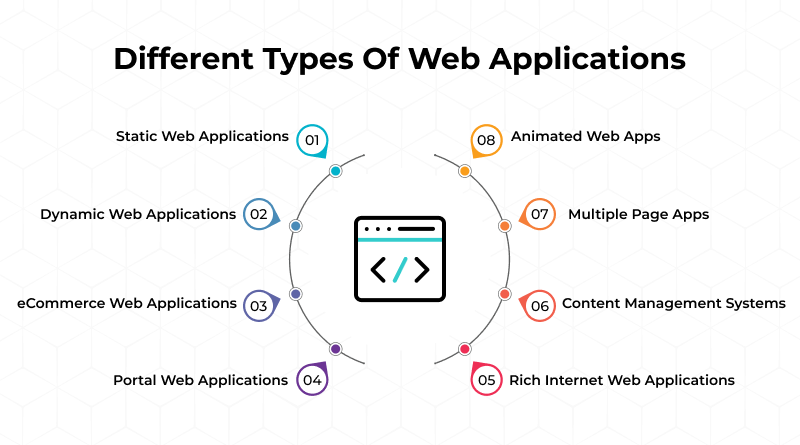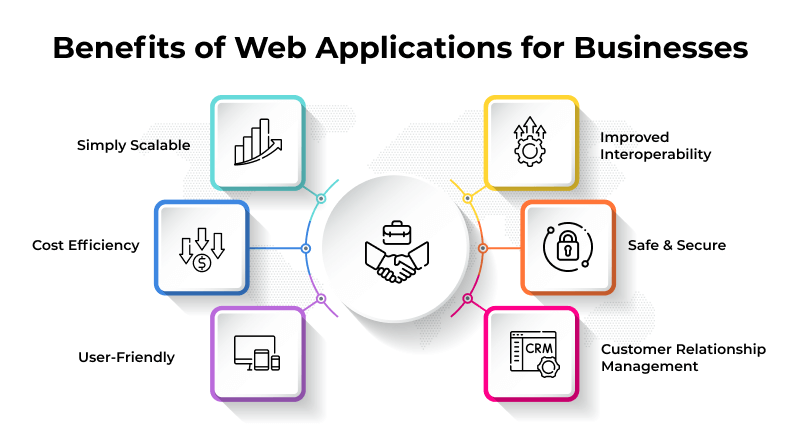The year 2020, made a paradigm shift in the digital world. Amid the pandemic crisis, the web world grew exponentially. In the first year of the pandemic, internet usage increased to 10.2%. It’s been 4 years down the line, and different types of web applications are created to meet the end-user requirements. From eLearning to stock trading, and food delivery to health checkups all categories of web applications are available in this fast-paced era.
The digital revolution has just begun and many types of web apps will mark their presence soon. Every web app needs a reliable web hosting infrastructure for online availability to users. It could be PHP hosting if applications are built on the PHP framework. Or else, it could be cheap nodejs hosting also if a web application is built on the Node.js framework.
But what are the benefits and usage of these web applications? If you want to know more, pay attention to this article. We discussed some unheard benefits and use cases of different types of web applications.
Table of Content
What is a Web Application?
Website and web application are two different IT jargon. Web applications are software or programs developed and hosted on remote servers. It is accessible on any web browser or device. Whereas, the website gives detailed insight about any product. In terms of UI//UX, web apps are more handy in comparison to websites. With web applications, users can view products, view and pay online.
Web applications are user-friendly because of their placeholder texts, navigation, and user-friendly interface. Next-gen businesses rely on different types of web applications to provide the best-quality products/services to their customers. They deploy cloud technology to make an ideal environment for web applications and ensure their maximum availability.
How Do Web Applications Work?
Web applications don’t need to be downloaded. They are accessed online through a web browser. In contrast, mobile applications need device installation for accessibility. Some of the mobile apps do not require an internet connection, but web applications do. Every web app needs an application hosting server to handle clients’ requests. If your web applications get higher traffic then a buying cloud hosting server or managed dedicated hosting server are good choices for you.
Web apps are written in JavaScript, HTML5, or CSS. These are client-side programming languages that build the front end of the application. If you want to go with server-side programming, opt for Python, PHP, Java, and Ruby to write server-compatible scripts. Both are different and you can read PHP vs JavaScript: Languages that Your Website Understands.
Different Types Of Web Applications

Static Web Applications
Static web applications are the simplest type of web application built on HTML and CSS. It is suitable for creating personal portfolios or digital brochures.
In this type of web application, only manual changes are possible from the developer’s end. Static web applications are easy to create and host through static site hosting. This is because they don’t require extensive server-side processing. Many small businesses and individuals are looking for a simple online presence and functionality.
| Static Web Applications | |
| Benefits | Use Cases |
| Less vulnerable to hacking attacks | Blogs |
| Affordable | Sales and marketing |
| SEO friendly | Under-development websites |
Dynamic Web Applications
Dynamic web applications are interactive and are more complex. They use client-side and server-side scripts like PHP, JavaScript, ASP, and JSP to generate content in real time. These categories of web applications are connected to a database, allowing them to offer a personalized experience based on user interaction and preferences.
Business owners should consider them if engaging users and varying content are top priorities. Developing and maintaining dynamic web applications is more challenging due to their complexity. The costs of web development and hosting are higher for these sites.
| Dynamic Web Applications | |
| Benefits | Use Cases |
| Scalable | B2B operations |
| More reach among audience | IT and healthcare |
| Flexible with updates | Social media apps |
eCommerce Web Applications
eCommerce web applications provide a user-friendly experience and a seamless way to encourage sales and repeat businesses. In order to handle varying traffic levels and sales volumes, these applications must be scalable.
In addition, sensitive customer data, such as payment information, needs to be protected with high security. Various plugins enhance functionality on platforms like Shopify, Magento, and WooCommerce.
Because of these eCommerce applications, the retail sector has evolved and reached a wider audience to operate 24×7 as a marketplace.
| eCommerce Web Applications | |
| Benefits | Use Cases |
| Better customer analytics | Online payments |
| Low-cost business operation | Quick commerce |
| Easy to manage | On-demand streaming |
Portal Web Applications
Portal web applications, also known as web portals, are web-based platforms that collect information from multiple sources and present it in a single user interface. Portal web applications are often interactive and secure and provide a single access point to applications and information. They can also modify data and communicate with other entities. There are different industry segments like IT, manufacturing, and more incorporating these types of web applications.
| Portal Web Applications | |
| Benefits | Use Cases |
| Better communication | Client portals |
| Improved productivity | Community portals |
| Centralized management | Student portals |
Multiple Page Apps
All the web pages where users interact with multiple web pages are called multiple page apps. Multiple page apps include different landing pages connected. Popular eCommerce website Amazon is the perfect example of this category of web application. Even your Google Docs that are included in the G Suite are included in this category. It is good for SEO, easy to develop, and navigates from users’ point of view.
| Multiple Page Apps | |
| Benefits | Use Cases |
| Highly scalable | Complex admin tools |
| Easy analysis of website | List pages and detail pages |
| SEO friendly | Sharing state and APIs |
Rich Internet Web Applications
Rich Internet Applications (RIAs) are the widely used web apps with the multi-functionality feature. Plugins on the client side enable them to work around browser limitations. These types of web applications are more user-friendly, interactive, and compatible with older desktop applications. The best part about them is, they can be accessible offline and online. One major risk associated with it Is that if the plugin is outdated, many parts of the app, or the whole app needs to be fixed.
| Rich Internet Web Applications | |
| Benefits | Use Cases |
| Responsive user experiences | Adobe Flash Builder |
| Better data visualization | Microsoft Silverlight |
| Master synchronization | Browser extensions |
Content Management Systems
There are dedicated web applications that manage the digital content of users. These are called Content Management Systems. WordPress is the best example that facilitates content production and its management. Thus, it is called CMS (Content Management System).
Whether you are a beginner, or experienced professional, CMS allows you to manage the content without technical know-how. There is no requirement for coding and technical knowledge to create a website. When exploring CMS options for website development, Joomla hosting stands out as a reliable choice alongside platforms like WordPress, Drupal, and others.
| Content Management Systems | |
| Benefits | Use Cases |
| Offers quick updates | Blogging platforms |
| Content creation is easy | News website |
| No technical expertise required | Marketing and CRM software |
Animated Web Apps
Animated web applications are infotainment/entertainment based web apps. These apps are usually built on HTML5, JavaScript, CSS, FLASH, and SVG. These days, websites integrate anime to captivate the attention of visitors. Google’s Your Plan, Your Planet, and Species in Pieces are some of the best examples of animated web apps.
| Animated Web Apps | |
| Benefits | Use Cases |
| Better UI/UX | Gaming apps |
| Easy navigation | Animation videos |
| Intuitive branding | Reward apps |
Benefits of Web Applications for Businesses

Simply Scalable
Web applications are easy to scale and expand according to the different requirements of the digital business. Customizing and scaling all common web applications is a tedious task. This same principle is not applied to customized web applications. It aligns with the common marketing strategies of businesses.
With robust web applications, business owners get different metrics like sales, products, new customers, and repeated customers. Analyzing these data and strategizing subsequent marketing goals are both potential benefits of a web application.
Cost Efficiency
Conventional businesses are capital intensive. But nowadays many next-gen ventures have shifted towards the new operational model. Digitization introduced many web applications which are affordable and many of them support several operating systems.
Another benefit of web applications is they are widely used on different web browsers. Also, no regular hardware or software updates are required which reduces overall capital expenditure. Regular monitoring, fixing security patches, and updating the system abort the need to pay extra to purchase a new web app.
User-Friendly
A user-friendly website is responsive, meaning it is optimized to display properly on all devices, including desktops, laptops, tablets, and smartphones. Web applications must be developed according to the end-user’s requirements. If your website application performing well, your targeted audience will increase with time.
Build custom web apps that are easy to update on the server-side. Hence, users need not update their devices according to web applications’ requirements. Keep user experience and engagement rate in mind while designing a web application. It is the most common mistake that 35% of web designers skip.
Customer Relationship Management
A successful business model is determined by its streamlined customer relationship management (CRM). Ensure a free flow of communication and increase the interaction rate with customers. Your web application must have the right communication channels like live chat, phone, and email that serve customer’s professional needs.
Get a team ready that facilitates 24×7 support to customers and resolve their issues in less time. It builds a trust factor as customers are more aligned towards your brand instead of switching to your competitors.
Safe & Secure
Bare metal server prices are considered the safest way to host multiple websites. It is because website owners get full root access and dedicated resources like CPU, RAM, and storage. Likewise, users seek secured web applications with global compliance.
Web applications hosted on a managed dedicated server not only shield the data but also prohibit possible data breaches. There will be no third-party installation that leaves the system insecure. Secured web applications enhance productivity by securing sensitive information.
Improved Interoperability
Web applications attain a higher interoperability level than isolated desktop programs. For example, integrating an online shopping cart system with a web-based accounting package facilitates communication between two proprietaries.
Therefore, many corporate systems incorporate different types of web applications to improve workflow and business operations. With them, your business adapts to changing market trends.
The web application landscape is brimming with possibilities. By understanding the different types of web applications – from static to dynamic – you can unlock a new level of functionality and engagement for your users.
In 2025, we’re moving beyond the well-known benefits. Web apps are poised to offer unheard-of advantages, like enhanced accessibility through features like voice control and real-time translation, or integration with cutting-edge technologies like augmented reality (AR) and the Internet of Things (IoT).
The use cases are vast and constantly evolving. Imagine a progressive web app that guides you through a museum exhibit using AR, or a content management system (CMS) that personalizes website content based on a user’s location and interests.
As web development continues to break new ground, the true potential of web applications is only beginning to be realized. So, dive in, explore the options, and discover how a web app can revolutionize the way you connect with your audience.
FAQs
What are web applications?
Web applications are software programs that you access through a web browser, like Chrome or Firefox, instead of downloading and installing them on your device. They run on remote servers and deliver functionalities over the internet. Examples include Gmail, Google Docs, social media platforms, and online shopping sites.
How do web apps differ from traditional desktop applications?
Web apps are different from desktop applications in different aspects which includes accessibility, updates, software requirements, maintenance, and functionality.
What technologies are commonly used to develop web applications?
There is a combination of different technologies to develop front-end and back-end web applications.
1. Front-end: HTML, CSS, JavaScript (JS) libraries like React or Angular
2. Back-end: Programming languages like Python, Java, PHP, .NET. Web servers and databases are also crucial.
How can I decide which type of web application is best for my project?
Here are some factors to consider while choosing the best web application for the project.
1. Project goals: Determine project’s functionality. Does it involve complex calculations or data storage?
2. Target audience: Define the target audience your web application will cater to.
3. Budget and resources: How much can you invest in development and maintenance?
4. Security: Does your application handle sensitive data?















